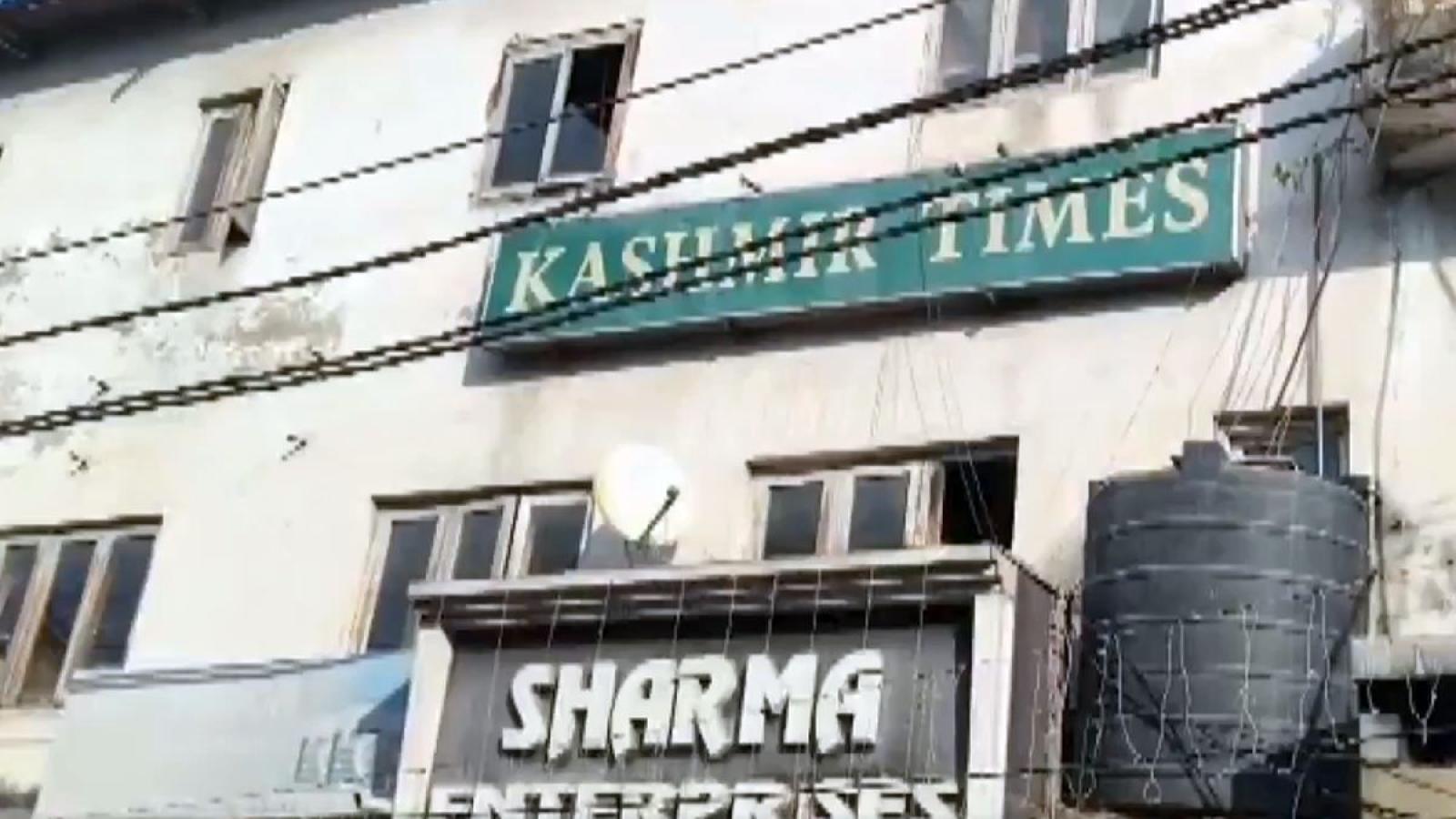Editors say SIA raids intended to intimidate, delegitimise, ultimately to silence
By: Javid Amin | 20 November 2025
On 20 November 2025, Jammu & Kashmir’s State Investigation Agency (SIA) conducted a dramatic raid on the offices of Kashmir Times in Jammu. Authorities allege that the newspaper’s premises housed AK rifle cartridges, pistol rounds, and grenade pins — claiming it was part of a coordinated effort to spread “anti-national” content.
But the editors of Kashmir Times, backed by opposition parties, dismissed the operation as a blatant attempt to intimidate independent journalism and silence a critical voice in Kashmir. This incident has sparked a fresh debate around the fragile balance between national security and press freedom in a region long marred by conflict.
What Exactly Happened
01. The Raid Unfolds
-
The SIA, a security wing of Jammu & Kashmir Police, raided the head office of Kashmir Times, located on Residency Road in Jammu.
-
According to officials, the raid was linked to a broader FIR under Section 13 of the Unlawful Activities (Prevention) Act (UAPA) for allegedly promoting “activities inimical to the state.”
-
Investigators examined computers, documents, and other digital devices during the search.
02. Items Seized
-
The SIA claimed to have recovered:
-
AK-series rifle cartridges (including empty cases)
-
Live AK rounds and fired bullets
-
Grenade safety levers / grenade pins
-
Suspected pistol rounds as well.
-
-
All the items were reportedly seized “following due legal procedure.”
The Official Justification: What the Authorities Say
-
The SIA framed the raid as part of an ongoing investigation into a terror module, alleging that Kashmir Times had “disseminated terrorist and secessionist ideology.”
-
According to statements attributed to the agency, the accusations extend to:
-
“Spreading inflammatory, fabricated and false narratives”
-
“Attempts to radicalize youth in J&K”
-
“Inciting disaffection and separatist sentiments”
-
And “challenging the sovereignty and territorial integrity of India” through both print and digital content.
-
Kashmir Times’ Response: Defiance and Accusations of Silencing
01. Editors Speak Out
-
Anuradha Bhasin, Executive Editor, said she was “surprised, not shocked.” She noted that the Jammu office had been dormant for years, without regular staff or printing operations.
-
In a strong joint statement, editors Prabodh Jamwal and Anuradha Bhasin condemned the raid:
“The reported raids … the baseless accusations … the coordinated crackdown … yet another attempt to silence us.”
-
They continued:
“Criticising the government is not the same as being inimical to the state … A robust, questioning press is essential to a healthy democracy.”
-
They also defended their legacy:
“Our work … strengthens our nation. It does not weaken it.”
-
The editors made it clear:
“Journalism is not a crime. Accountability is not treason … The state may have the power to raid our offices. But it cannot raid our commitment to the truth.”
02. Questions Raised by Kashmir Times
-
Bhasin said it was bewildering to raid a space that “has been a shut space for years.”
-
She added that Kashmir Times has not had a print edition recently, operating mostly online.
-
The editors also noted that their print edition was suspended in 2021–22 after “relentless targeting”.
-
They appealed to civil society and fellow journalists, calling for the charges against them to be withdrawn.
Political Fallout: Reactions and Ramifications
01. NC & PDP Speak Out
-
The National Conference (NC) and Peoples Democratic Party (PDP) condemned the raid, calling it a “pressure tactic” aimed at stifling media independence.
-
Surinder Singh Choudhary, Deputy Chief Minister, warned that action must be based on evidence.
“If you do it only to put pressure … that will be wrong.”
-
Iltija Mufti (PDP leader) noted that Kashmir Times has historically resisted intimidation. She said the raid “reeks of high-handedness” and questioned whether dissenting voices were being labeled “anti-national” simply for doing their job.
-
Aditya Gupta (PDP youth president) invoked the legacy of Ved Bhasin (founder of Kashmir Times), calling the paper one of the boldest voices in J&K.
02. Press Freedom Groups Raise Alarms
-
The Committee to Protect Journalists (CPJ) called the raid “deeply troubling” and demanded transparency on the legal basis for the action.
-
CPJ’s Asia-Pacific coordinator, Kunal Majumder, stated:
“News outlets should not face punitive action simply for doing their journalistic work.”
-
According to Al Jazeera, the raid has been framed in some quarters as part of a pattern of intimidation against media outlets in Kashmir.
03. Wider Implications for Media in J&K
-
The Kashmir Times raid is seen by many as part of a wider crackdown on dissenting voices in a region already sensitive to security.
-
Given the history of the Kashmir Times (founded in 1954 by Ved Bhasin), its targeting raises deep concerns about press freedom and the shrinking space for independent journalism in Jammu & Kashmir.
Context: Kashmir Times’ Legacy and Prior Targeting
-
Kashmir Times is one of the oldest English-language newspapers in J&K, established by veteran journalist Ved Bhasin in 1954.
-
Its Srinagar office was sealed in October 2020, a move that alarmed press freedom advocates.
-
Over the years, the newspaper has been known for critical reporting, especially on governance, human rights, and political repression — making it a key independent voice in Kashmir.
-
According to its editors, despite suspending its print edition, the paper has continued digitally, with its reporting publicly available on its website.
Analysis: Why This Raid Matters and What It Signals
01. A Test for Press Freedom in J&K
-
The raid raises fundamental questions about media freedom in a conflict region: When national security is invoked, can authorities justify actions that may suppress dissent?
-
Independent media, especially in Kashmir, has historically balanced on a knife-edge — expected to report the truth while navigating intense political scrutiny. This incident could mark a new escalation.
02. Credibility and Legal Risk for Kashmir Times
-
The seizures (if verified) pose serious legal jeopardy for Kashmir Times. Ammunition and grenade parts, depending on origin and ownership, may trigger anti-terror or UAPA charges.
-
For its part, the Times insists that the office was non-functional, which, if proven, could challenge the legitimacy of the raid or at least its basis.
03. Broader Political Play
-
Opposition parties framing the raid as a “pressure tactic” suggests this is not just a law-enforcement action but carries political overtones.
-
For the government, such operations may serve dual purposes: enforcing security measures and sending a message to critical media channels.
04. Symbolic Weight of Kashmir Times
-
Because Kashmir Times has a storied legacy, its targeting is symbolically potent — it’s not just any newspaper, but one whose readership, history, and credibility carry weight.
-
If independent journalism is weakened in Jammu & Kashmir, the space for accountability, dissent, and local voices could shrink further.
Risks & Future Scenarios
01. Risks for Kashmir Times
-
Legal prosecution: If investigations advance, the promoters and editors may face serious criminal charges.
-
Operational disruption: Even if not shut down, the paper’s digital operations could be disrupted, morale could suffer, and sources may be intimidated.
-
Reputational damage: Whether or not the allegations are true, the public association with arms could damage its credibility.
02. Risks for Authorities
-
Backlash from civil society: Press freedom organizations, national and international media, and human rights activists may increase scrutiny.
-
Political cost: If the raid is seen as politically motivated, it could deepen mistrust between media and the state.
-
Legal scrutiny: Courts may be called upon to adjudicate whether the raid and its basis for action respect due process.
03. Potential Outcomes
-
Investigation Deepens: SIA may press ahead, leading to formal charges, and Kashmir Times may have to mount a legal defense.
-
Negotiated Settlement: Kashmir Times might try to negotiate with authorities — though this could compromise its independence.
-
Media Solidarity: Other media and civil society groups may rally to defend the Kashmir Times, increasing public pressure on authorities.
-
Policy Repercussions: The incident could catalyze debate on media regulation, press freedom, and the use of UAPA in J&K — potentially influencing future policy.
Conclusion
The SIA raid on Kashmir Times‘ Jammu office is a flashpoint in Kashmir’s ongoing battle between security narratives and media freedom. While authorities claim they uncovered serious ammunition and warrant a criminal investigation, the paper’s editors and political critics argue the move is less about law enforcement and more about neutralizing a powerful dissenting voice.
This incident underscores a growing dilemma: in regions with conflict and high security sensitivity, how much space is there for critical journalism? And can independent media survive when its operations are criminalized under the guise of national interest?
Whatever the legal outcome, the raid will be watched closely — both for its implications for Kashmir Times and for what it signals about the future of press freedom in Jammu & Kashmir.



